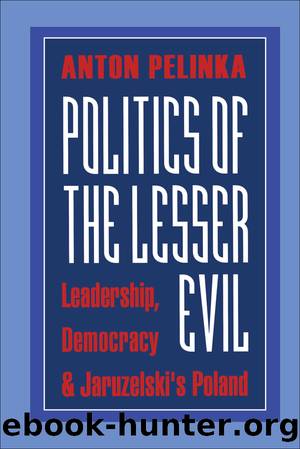Politics of the Lesser Evil by Anton Pelinka

Author:Anton Pelinka [Pelinka, Anton]
Language: eng
Format: epub
Tags: History, Europe, Eastern, General
ISBN: 9781412831444
Google: yEttbZ5nlHQC
Publisher: Transaction Publishers
Published: 1999-01-15T01:32:26+00:00
14
On the Amorality of Foreign Policy
Wilson: Principles without Strategy â Roosevelt: Principles and Strategy â Johnson: No Principles and no Strategy â Nixon: Strategy without Principles
During the course of the First World War, a player stepped onto the stage of world politics that had, until then, rather fearfully kept its distance from international involvement: the United States.
The U.S. came with high moral claims. The Allies who had enticed their new partner into the World War used these claims to manipulate her. They let her play the morality game as harmless tomfoolery. Henry Kissinger describes how the British Foreign Minister Edward Grey was able to use the imputed idea of a League of Nations to lead into temptation an American President already viewed as an idealist (Kissinger 1994, 223). And Woodrow Wilson was only too eager to fall into the trap. He wanted to conduct a war that would make the world âsafe for democracy,â a war whose goal was to put an end to all war. Realpolitik for this emissary of the new world power was immoral. At stake was democracy as an international order, collective security and especially, the right of peoples to determine themselves.
Yet from the beginning, this concept, the rhetoric of which Wilson forced upon his Allies in the agreements, had a strange operational weakness. The noble wishes and goals were only loosely bound to concrete politics. Wilson knew what he wanted, but he had no idea how to achieve what he wanted.
The First World War in particular was, from the beginning, an antithesis to the notion of the American President. The participation of the European masses more or less used to democracy, their terrible sacrifices, and the propaganda necessary for legitimation on the domestic front had provided for a fundamental change in this primarily European war. It was no longer a nineteenth-century war of Cabinets, but a democratized war of the masses of the 20th century. But precisely for that reason, compromises, flexibility, and thus a relatively quick end to the war were not possible. The democratization of the European war of 1914 made of it an exhausting war that destroyed the masses, precisely because it wanted to and had to build on the approval of the masses (Kissinger 1994, 219).
The democratization of the war had greatly reduced its political maneuverability. The democratic war was latently totalitarian as early as 1914. It had to be defined and propagandized as a crusade against the powers of darkness in order to achieve the democratically necessary approval of the masses. The war had stopped being a means of politics that could be arbitrarily deployed by the political elite. Once set in motion, the democratic war could not be controlled, precisely because it was democratic.
Woodrow Wilsonâs successes, which ultimately ended in a gigantic failure, demonstrated the dilemma and the tendency toward the mutual incompatibility of democracy and leadership in foreign policy. Under Wilsonâs leadership, the victorious powers wrote moral goals like the self-determination of nations across their banners, with the
Download
This site does not store any files on its server. We only index and link to content provided by other sites. Please contact the content providers to delete copyright contents if any and email us, we'll remove relevant links or contents immediately.
The European Opportunity by Felipe Fernández-Armesto(578)
The European History Highway: A Guide to Internet Resources by Dennis A. Trinkle Scott A. Merriman(543)
The Seven Wonders of the Ancient World by Michael Denis Higgins(530)
Morgan Kaufmann Digital Watermarking and Steganography by Ingemar Cox Matthew Miller Jeffrey Bloom Jessica Fridrich Ton(530)
European Security without the Soviet Union by Stuart Croft Phil Williams(513)
Hyperculture by Byung-Chul Han(512)
The Routledge companion to Christian ethics by D. Stephen Long Rebekah L. Miles(510)
European Security in a Global Context by Thierry Tardy(507)
Get Real with Storytime by Julie Dietzel-Glair & Marianne Crandall Follis(445)
Hudud Al-'Alam 'The Regions of the World' - a Persian Geography 372 A.H. (982 AD) by V. V. Minorsky & C. E. Bosworth(440)
Tibetan Studies in Comparative Perspective by Chih-yu Shih Yu-Wen Chen(437)
Gorbachev And His Generals by William C. Green(430)
Governance, Growth and Global Leadership by Espen Moe(428)
CliffsNotes on Fitzgerald's The Great Gatsby by Kate Maurer(415)
How Languages Are Learned 5th Edition by Patsy M Lightbown;Nina Spada; & Nina Spada(410)
The Egyptian Economy, 1952-2000 by Khalid Ikram(389)
The Oxford History of the World by Fernández-Armesto Felipe;(388)
The Oxford Handbook of the Incas by Sonia Alconini(372)
Oral Poetry and Narratives from Central Arabia: The Poetry of Ad-Dindan : A Bedouin Bard in Southern Najd (Studies in Arabic Literature, Vol 17) (English and Arabic Edition) by P. M. Kupershoek P. Marcel Kurpershoek(368)
